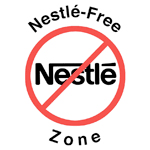- cross-posted to:
- [email protected]
- world
- cross-posted to:
- [email protected]
- world
cross-posted from: https://lemmy.world/post/14389267
Nestlé adds sugar to infant milk sold in poorer countries, report finds
Swiss food firm’s infant formula and cereal sold in global south ignore WHO anti-obesity guidelines for Europe, says Public Eye
Nestlé, the world’s largest consumer goods company, adds sugar and honey to infant milk and cereal products sold in many poorer countries, contrary to international guidelines aimed at preventing obesity and chronic diseases, a report has found.
Campaigners from Public Eye, a Swiss investigative organisation, sent samples of the Swiss multinational’s baby-food products sold in Asia, Africa and Latin America to a Belgian laboratory for testing.
The results, and examination of product packaging, revealed added sugar in the form of sucrose or honey in samples of Nido, a follow-up milk formula brand intended for use for infants aged one and above, and Cerelac, a cereal aimed at children aged between six months and two years.
In Nestlé’s main European markets, including the UK, there is no added sugar in formulas for young children. While some cereals aimed at older toddlers contain added sugar, there is none in products targeted at babies between six months and one year.



Most infant formula in the US has corn syrup in the primary ingredients
Except it doesn’t?
The (not Nestle) powder we use ingredients:
Ingredients: Powder: Nonfat milk, lactose, vegetable oil (palm olein, coconut, soy and high oleic sunflower oils), whey protein concentrate and less than 2%: galactooligosaccharides*, polydextrose*, Mortierella alpina oil†, Crypthecodinium cohnii oil‡, calcium carbonate, potassium citrate, ferrous sulfate, potassium chloride, magnesium oxide, sodium chloride, zinc sulfate, cupric sulfate, manganese sulfate, potassium iodide, sodium selenite, soy lecithin, choline chloride, ascorbic acid, niacinamide, calcium pantothenate, vitamin A palmitate, vitamin B12, vitamin D3, riboflavin, thiamin hydrochloride, vitamin B6 hydrochloride, folic acid, vitamin K1, biotin, inositol, vitamin E acetate, nucleotides (cytidine 5’-monophosphate, disodium uridine 5’-monophosphate, adenosine 5’-monophosphate, disodium guanosine 5’-monophosphate), taurine, L-carnitine.
Infants need a diet high on fat for development, so this mixture makes sense. Maybe Gerber has a high corn syrup recipe, though (I don’t think they do for kids under 1 but rules are off when selling to toddlers and not infants).
This is enfamil. I had a hard time finding formula two years ago that didn’t have corn syrup as the primary ingredient.
Huh, I wonder if it’s regional. I think the other option around here is Similac which I don’t think has it but I’m not sure. I wouldn’t be surprised if Gerber has it, though I don’t think it’s even carried here anymore.
I don’t trust any corporation but I do know there are some regulations in place to help, at least with the infant stuff. (We used Enfamil two years ago too with my first born, in the height of the formula shortage, but the recipe doesn’t seem to have changed).
I think it is mostly in any formula that claims to be “gentle” or “easy to digest”. I live in a rual area and during the shortage I had to go to multiple stores to find something that wasn’t corn syrup.
Here is an interesting study related to the use of corn syrup vs lactose: https://www.ncbi.nlm.nih.gov/pmc/articles/PMC8912730/
Ah I also looked into it, and I think you’re right. In particular, lactose free ones especially use it. Emfamil swears it’s corn syrup solids but I don’t really trust that from their website.
And wow, that must have been rough. In the city it was still bad but I had lots of family and friends looking for spare powders and only once did we resort to the “easy to digest” one. Scary times, though…
deleted by creator
False
But our water has fluoride
How is that relevant? Why do you think that is bad? Do you realize that your teeth would probably be falling out in your 20s if it didn’t?
Oh no, I’m fervently pro fluoride, I’m just saying first world countries (eg USA) have an added layer of protection
deleted by creator